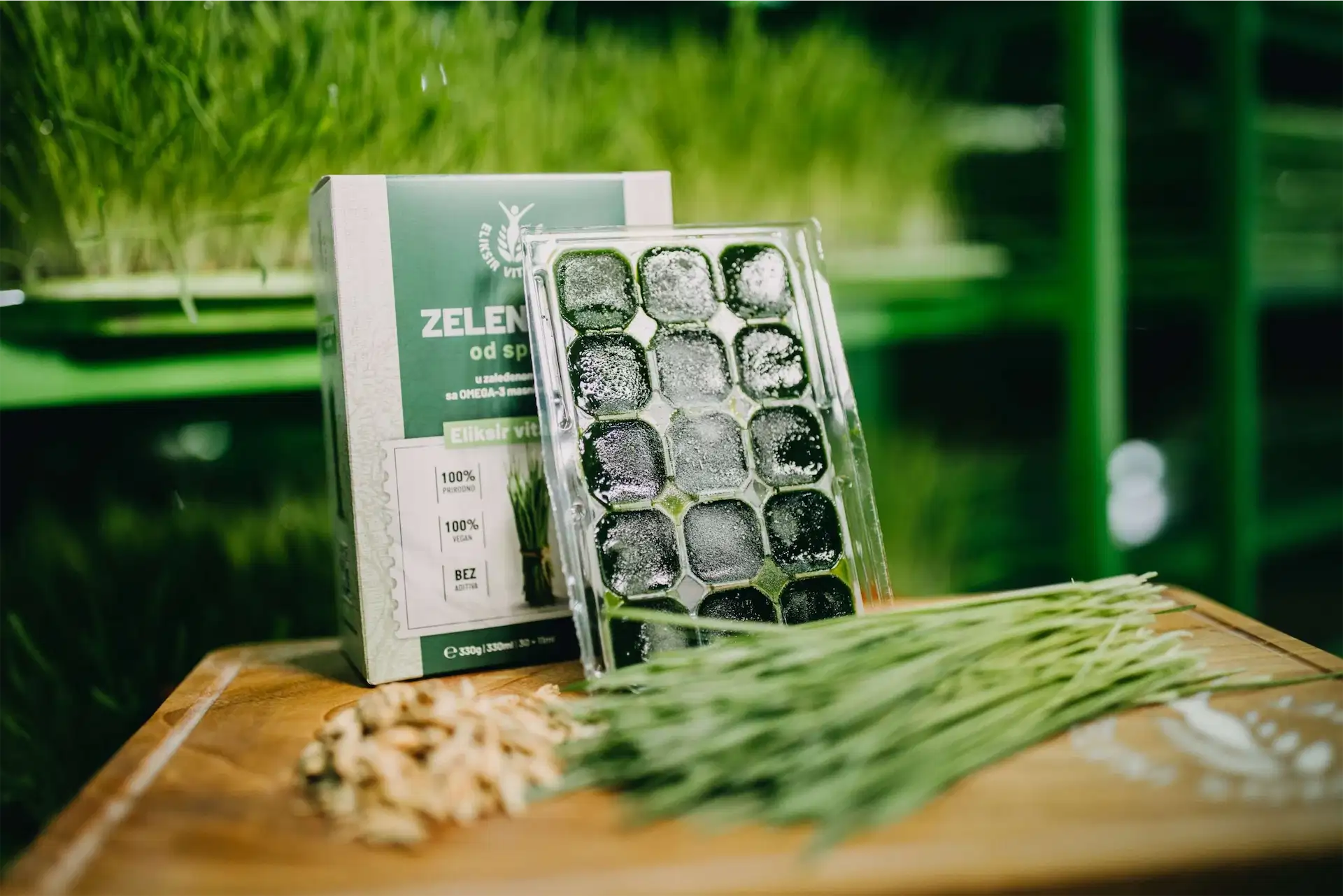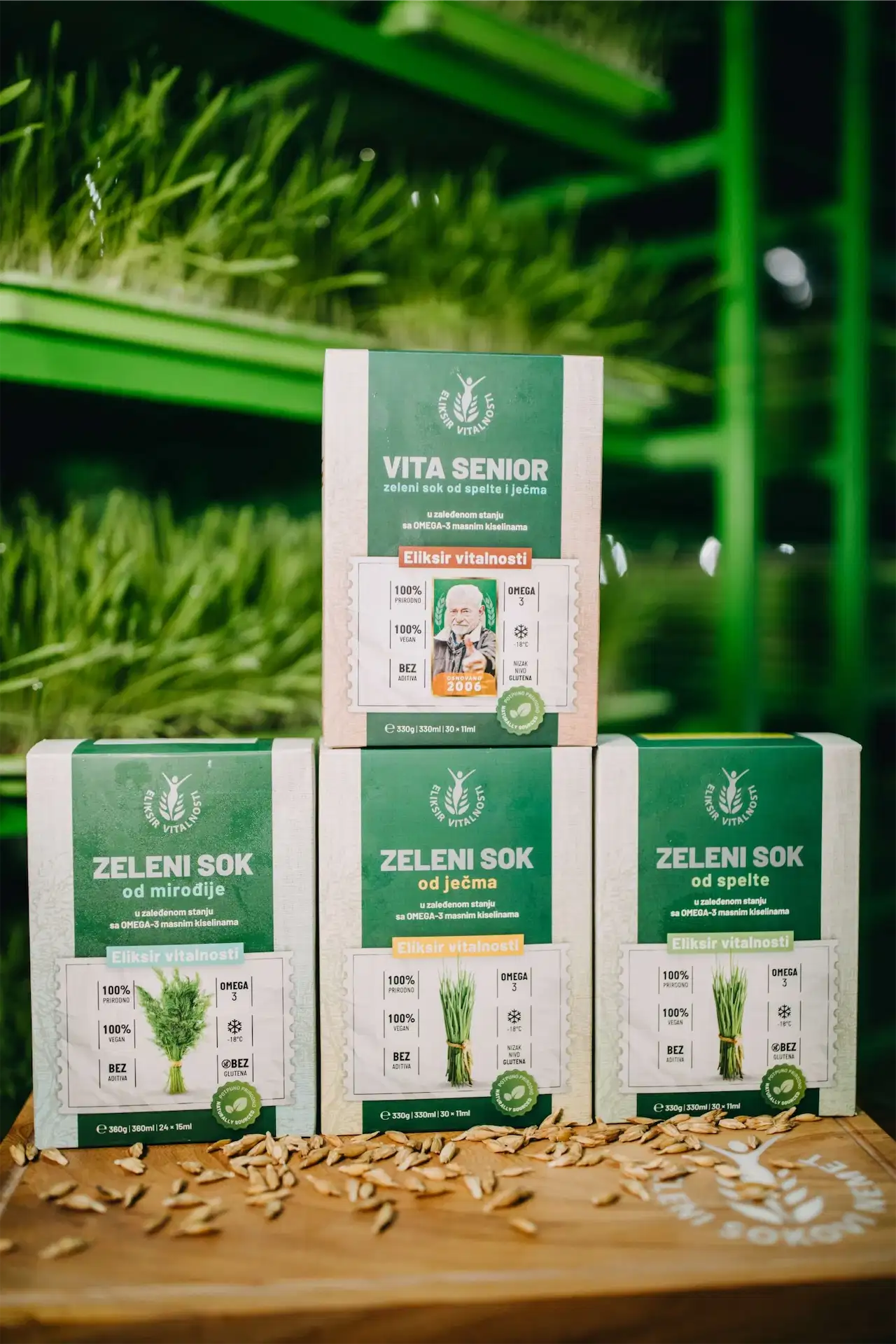Improvement of Blood Count

Poor blood count (often referred to as anemia) is a very common problem that can affect overall health and energy. When we say someone has a poor blood count, we usually mean reduced levels of hemoglobin and red blood cells in the blood – a condition known as anemia. This condition leads to organs not receiving enough oxygen, resulting in fatigue and weakness. Therefore, improving blood count is important to restore strength, immunity, and vitality of the organism. The good news is that there are natural ways to improve blood count, which can enhance blood count safely and long-lastingly, without the need for aggressive medications.
In the following, we will explain in detail the most common causes of poor blood count (anemia), what symptoms and consequences such a condition carries, and how to naturally improve blood count. We will pay special attention to nutrition and the main micronutrients (iron, vitamin C, vitamin B12, folic acid, chlorophyll) that are essential for healthy blood.
We will also introduce natural products and superfoods that can help – primarily spelt juice (a natural source of chlorophyll, iron, minerals, and antioxidants), as well as green barley juice, dill juice, and Spelta Life Balance tablets as additional blood support.
Causes of poor blood count (anemia)
There are several reasons why poor blood count can occur, and they are most often associated with some type of anemia. Anemia occurs when the body doesn't have enough healthy red blood cells or hemoglobin to carry oxygen to tissues. Here are the main causes:
- Iron deficiency: Iron deficiency is the most common cause of anemia. Iron deficiency occurs due to insufficient dietary iron intake, blood loss, or impaired absorption in the intestines. Women are particularly at risk (due to blood loss during menstruation and increased needs during pregnancy). Without enough iron, the body cannot produce enough hemoglobin, causing the blood count to decline.
- Vitamin B12 or folic acid deficiency: Lack of these vitamins (due to inadequate diet or poor absorption) interferes with proper red blood cell maturation and causes anemia. In practice, it often occurs in people who do not consume enough animal products (B12) or fresh vegetables (folate).
- Poor diet: A monotonous or low-quality diet that does not provide enough iron, vitamins, and proteins can lead to anemia over time. Without adequate “building materials” from food, bone marrow cannot produce enough blood cells.
- Chronic stress: Chronic stress (constantly elevated cortisol hormone) can interfere with proper absorption of iron and other nutrients, and often reduces appetite. Also, under stress, the digestive system suffers, which further worsens food utilization and can lead to poorer blood count.
- Chronic fatigue and physical exhaustion: Lack of sleep and constant excessive effort deplete nutrient reserves in the body, which can lead to a drop in iron and vitamin levels. Intense physical activity (especially in athletes or heavy physical jobs) also increases the need for iron and can lead to “sports anemia” if the loss is not compensated by a quality diet.
- Infections and chronic diseases: Long-term infections (e.g., Helicobacter pylori in the stomach) or chronic diseases (such as inflammation, autoimmune diseases, kidney diseases) can cause so-called anemia of chronic disease. Such conditions deplete iron and interfere with blood cell production in the bone marrow, which over time leads to a decline in blood count.
Symptoms and consequences of anemia
Our body often sends signals that the blood count is low. Symptoms of poor blood count usually include:
- Fatigue and weakness: Constant feeling of exhaustion, lack of energy for daily activities, and quicker fatigue during exertion.
- Pale skin: Skin and mucous membranes (e.g., inside of eyelids) may be pale due to lack of hemoglobin that gives them color.
- Dizziness and headaches: Low oxygen levels in the brain cause frequent dizziness, fainting, or “brain fog,” as well as headaches.
- Shortness of breath and rapid heartbeat: People with anemia often feel breathless during physical exertion, even when walking up stairs. The heart beats faster (palpitations) trying to compensate for the lack of oxygen in the blood.
- Cold hands and feet: Poor circulation and low hemoglobin lead to extremities being cold, even in warm weather.
- Decreased concentration and immunity: Anemic people often have problems with focus, irritability, and weaker resistance to infections (more frequent colds, slower wound healing).
If these symptoms are ignored, the consequences can become more serious. Severe anemia can lead to complications such as heart enlargement or heart failure (due to increased heart work), significant decrease in immunity, and even damage to the nervous system (especially with long-term vitamin B12 deficiency). In children, chronic anemia slows growth and cognitive development, and in pregnant women, it increases the risk of premature birth and other complications. Therefore, it is important to recognize symptoms in time and take steps to improve blood count.

Natural ways to improve blood count
Fortunately, many cases of anemia can be successfully resolved through lifestyle changes. Natural ways to improve blood count primarily involve proper nutrition and healthier habits, providing the body with all the necessary ingredients for blood formation. Below, we highlight two main things to pay attention to: a diet rich in micronutrients and stress reduction with enough rest.
One of the best natural remedies for anemia is spelt juice. It is obtained from young green shoots of spelt grain (a type of wheat) and frozen to retain all the precious ingredients. This concentrated green juice is rich in chlorophyll, iron and other minerals, as well as vitamins and enzymes necessary for healthy blood.
Regular consumption of spelt juice can significantly improve blood count. Spelt juice helps improve blood count as a natural source of chlorophyll, iron, minerals, and antioxidants. Unlike synthetic iron preparations, this green juice is easily digestible and gentle on the stomach, while alkalizing the body and raising energy levels. It is available in frozen form (for mixing with water) or tablets, which facilitates daily use.
Thanks to all of the above, spelt juice for blood count holds a special place as a natural aid for anemia.
Diet for anemia
Proper diet for anemia is the foundation for blood count recovery. Through food, we intake building blocks for blood, so the menu should be rich in foods containing iron, vitamin C, vitamin B12, folic acid, and other important substances. Below are some of the main micronutrients for improving blood count and ways to provide them through diet:
- Natural iron sources: Iron is the main mineral for hemoglobin, so increased iron intake is the first step in fighting anemia. Foods rich in iron include red meat (e.g., beef) and liver – these are sources of heme iron which is more easily absorbed. There are also plant sources rich in non-heme iron: green leafy vegetables like spinach, chard, nettle, parsley, dill, then beets, legumes (beans, lentils, chickpeas), pumpkin seeds, sesame, and dried fruits (dried apricots, raisins). To maximize the use of iron from nature, combine these foods with vitamin C sources (as vitamin C increases iron absorption), and avoid drinking tea or coffee with iron-rich meals (tannins from these drinks interfere with iron absorption).
- Vitamin C: This vitamin significantly improves the absorption of iron from plant sources. Therefore, always complement iron-rich meals with foods high in vitamin C. This can be citrus fruits (lemon, orange, grapefruit), kiwi, strawberries, currants, or vegetables like peppers, broccoli, Brussels sprouts, and cabbage.
- Vitamin B12: It is essential for the maturation of red blood cells. The best sources of vitamin B12 are animal products: meat, fish, eggs, liver, dairy products. Vegetarians and vegans are at increased risk of deficiency of this vitamin and often need to take supplements or B12-fortified foods.
- Folic acid (vitamin B9): Folate is a vitamin that, together with B12, participates in the creation of erythrocytes. It is found primarily in leafy vegetables (lettuce, spinach, kale, broccoli), then in citrus fruits (orange, lemon), legumes, and nuts. Folic acid is important for everyone, especially for pregnant women (prevents neural tube defects in babies and anemia in mothers) in preventing megaloblastic anemia.
- Chlorophyll: The green pigment in plants, often called “plant blood” due to its similarity to hemoglobin. It helps detoxify the body and supports blood formation. It is present in all green vegetables and algae, and especially concentrated in cold-pressed green juices.
Stress reduction and sufficient rest
Lifestyle habits also affect blood count. Chronic stress raises the hormone cortisol, which can interfere with the absorption of iron and other nutrients, and often leads to poor appetite. Therefore, it is important to apply relaxation techniques (e.g., meditation, light walking, breathing exercises) to relax the body. Equally important is quality sleep of at least 7 hours at night, as the body regenerates and creates new blood cells during sleep. Try to avoid bad habits like smoking and excessive alcohol, which adversely affect blood. Moderate physical activity is welcome for better circulation and appetite, but avoid exhausting workouts until you fully recover.
Other natural supplements for improving blood count
In addition to spelt juice, there are several other natural preparations that can provide additional help and natural blood support. Combining these preparations with dietary changes gives the best results. We present three products that stand out for their effects:

Green barley juice
Green barley juice (from young barley grass) is rich in chlorophyll, iron, vitamins, and minerals, similar to spelt juice, so it represents another natural way to improve blood count. Research shows that regular consumption of barley juice can increase hemoglobin levels and accelerate recovery from anemia. In addition to directly improving blood count, barley juice stimulates digestion and detoxification, so the body absorbs nutrients faster. It is easy to prepare (comes in frozen form that is mixed with water) and you can drink it daily as a dietary supplement.
Dill juice
Dill juice is another natural drink that positively affects blood count. Dill is rich in iron and vitamin C – an ideal combination for better iron absorption and hemoglobin formation. It also has a beneficial effect on digestion and stress reduction, which indirectly helps the body recover faster from anemia. Dill juice can be drunk alone or mixed with other green juices, and regular intake provides valuable micronutrients from nature.
Spelta Life Balance tablets
Spelta Life Balance tablets are actually lyophilized spelt juice in a convenient form. They are an ideal choice for those who want all the benefits of green juice but don't have time to prepare it every day. It is enough to take 1-2 tablets daily to intake chlorophyll, iron, and other nutrients for strengthening blood. This supplement is 100% natural and suitable for long-term use, without side effects.
The combination of a healthy diet, good habits, and natural supplements allows blood count to improve naturally. Results won't come overnight, but over time you will notice more energy, better concentration, and stronger immunity. If the anemia is more severe, consult a doctor, but even then these natural methods can be a valuable addition to therapy.










